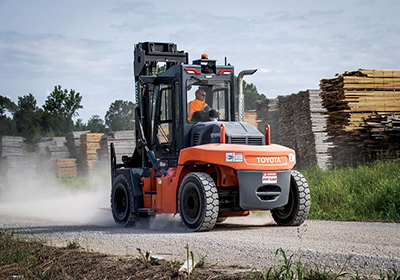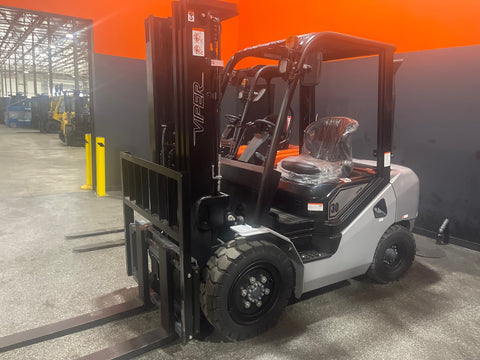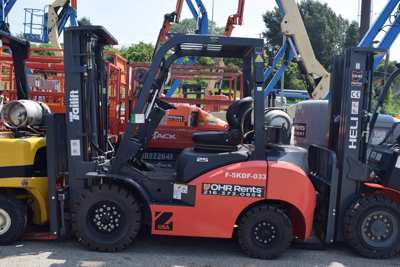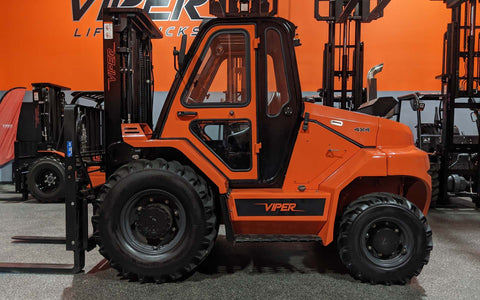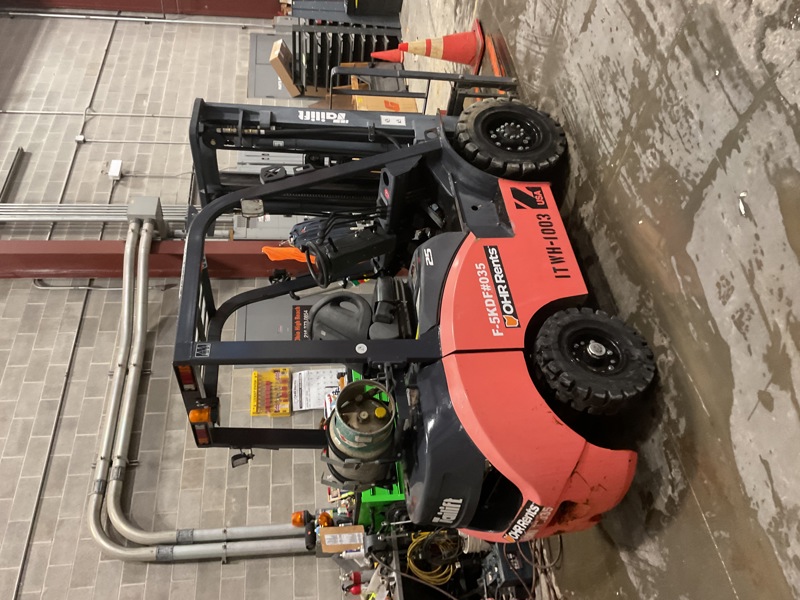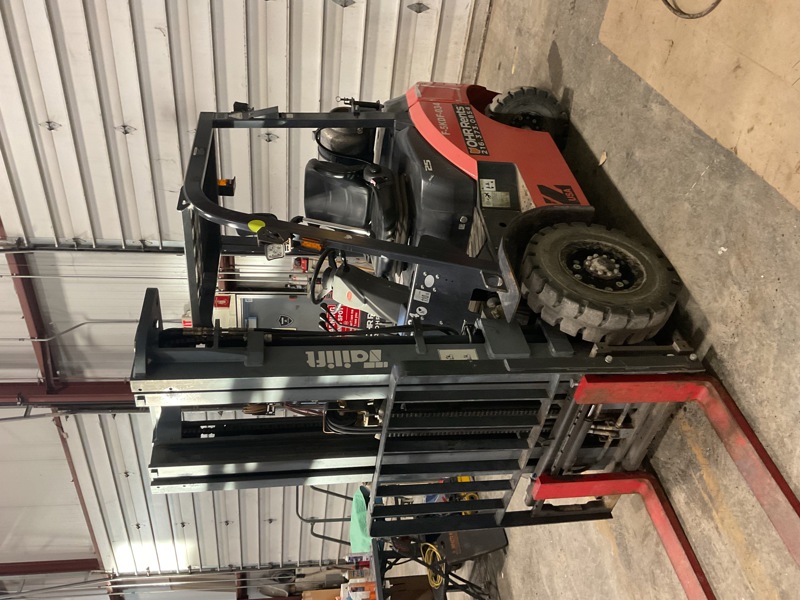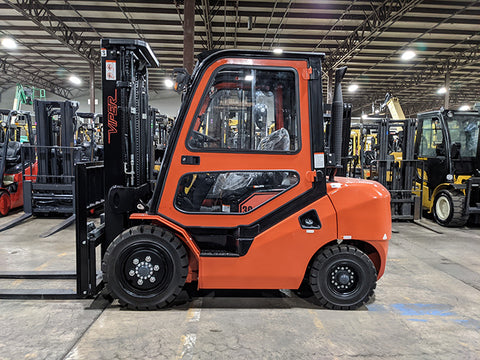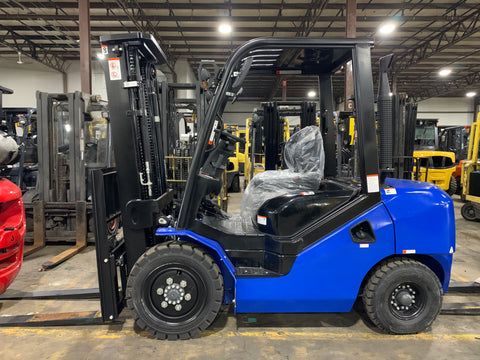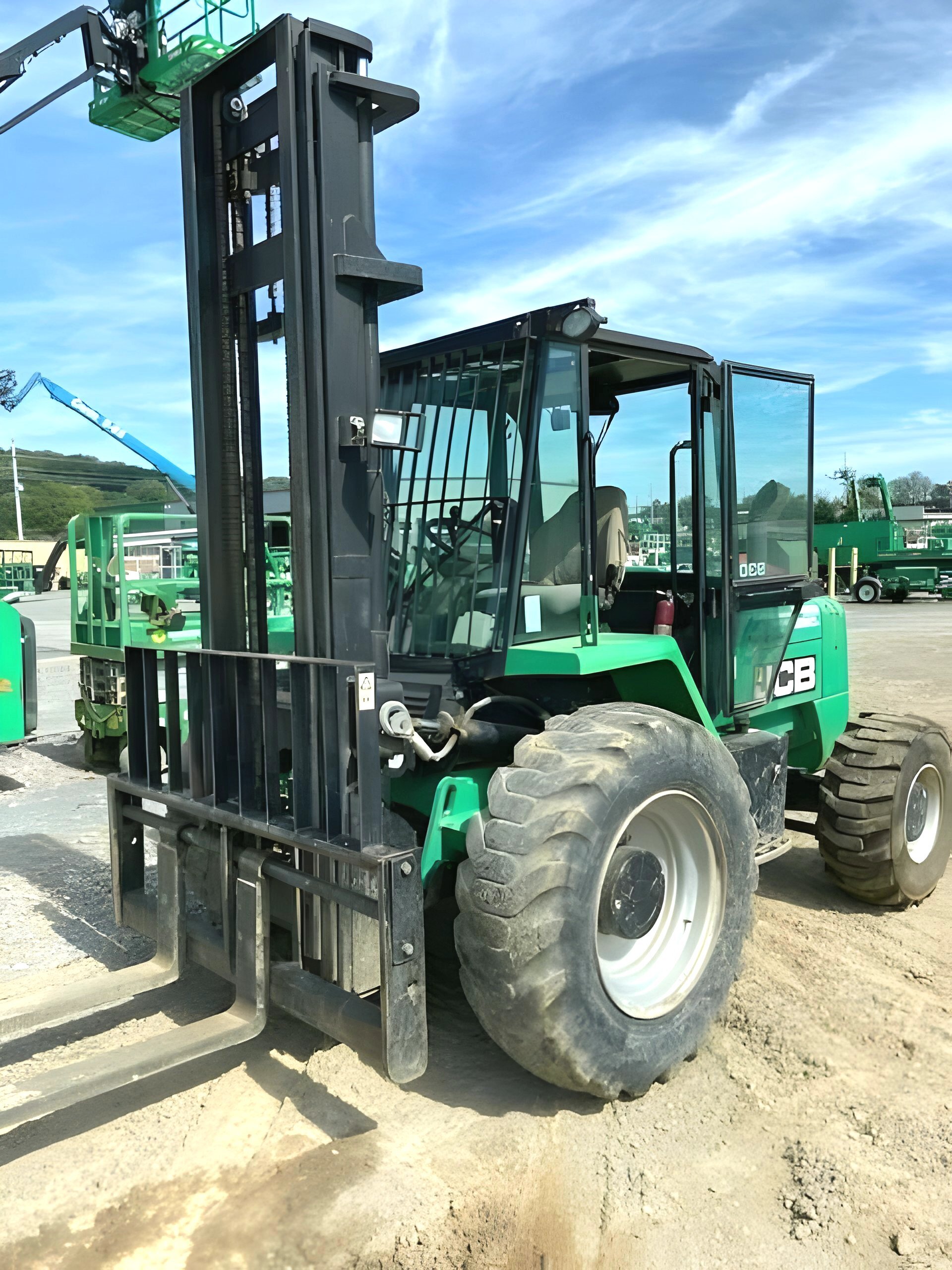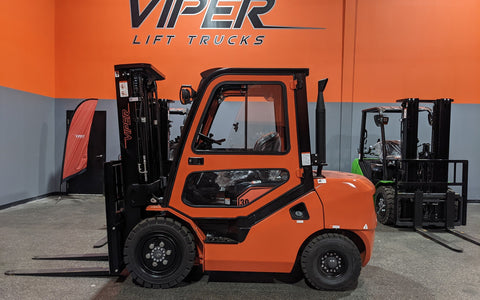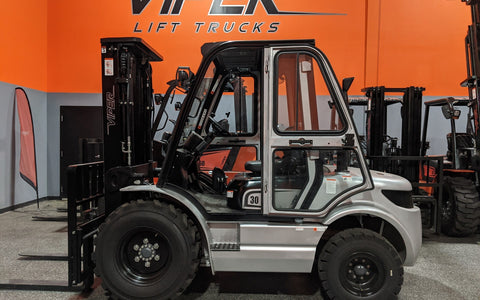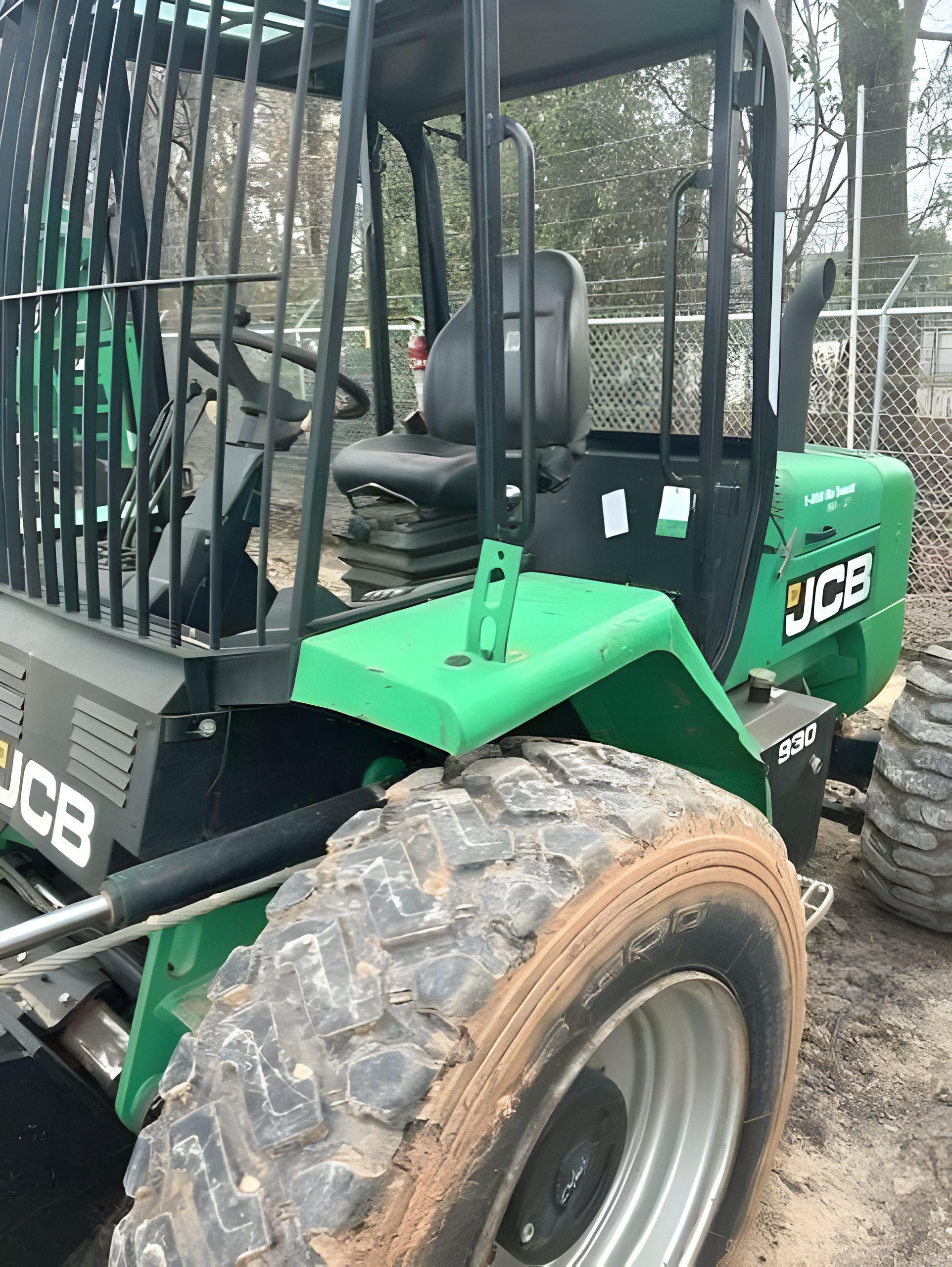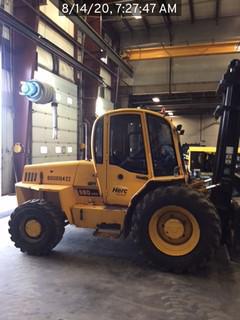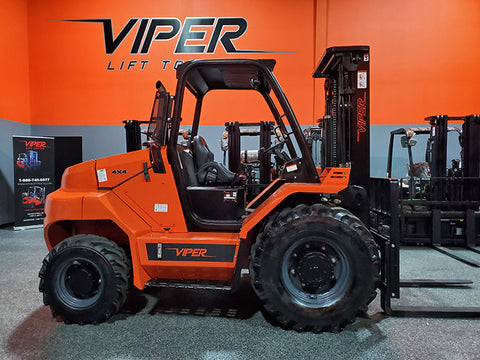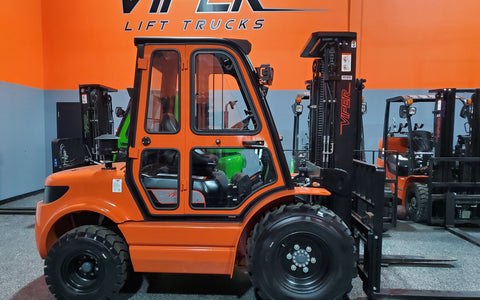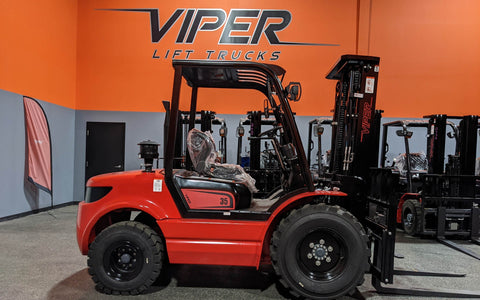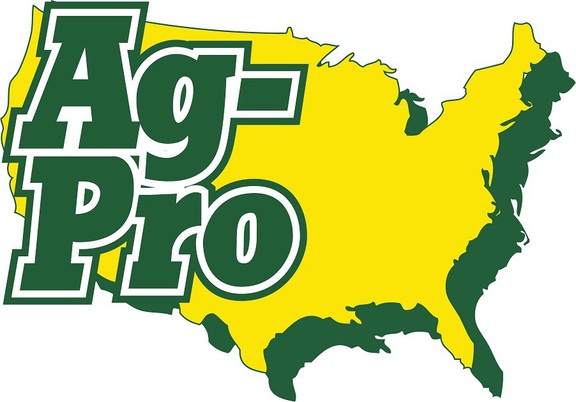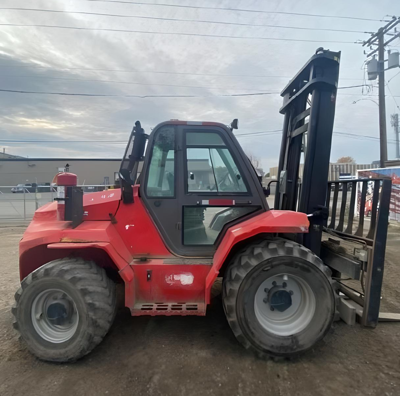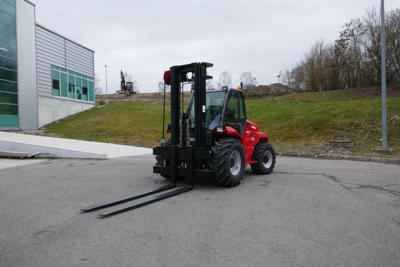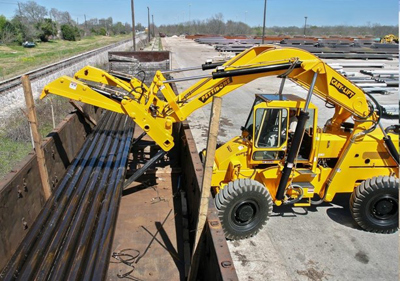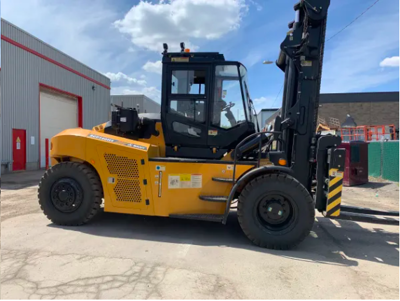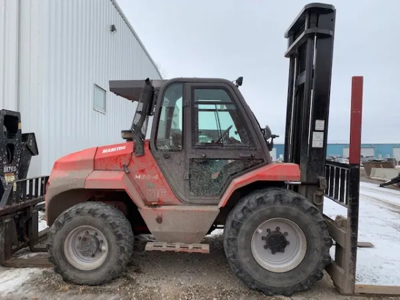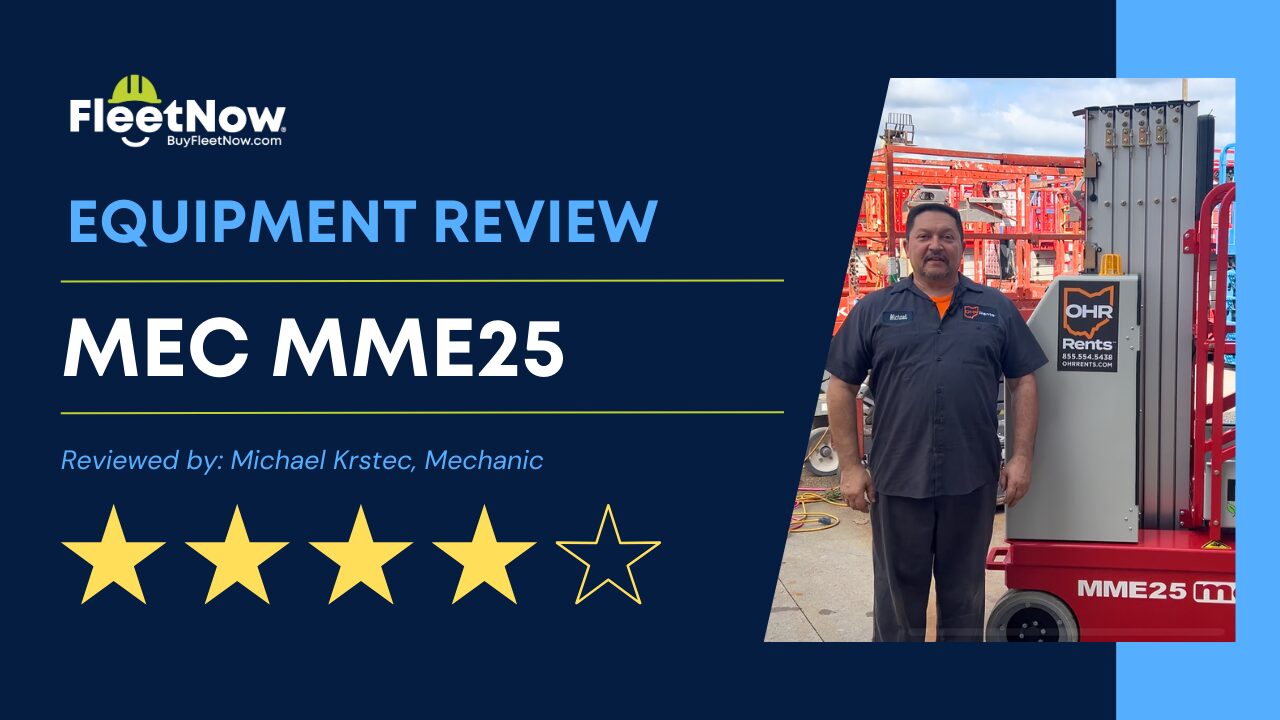Is a Rough Terrain Forklift the Same as a Telehandler?
A rough terrain forklift and a telehandler are not the same, though they share some similarities and can overlap in their applications. Key differences include:
Reach and Flexibility – Telehandlers have a significant advantage in reach and flexibility due to their telescopic boom, which can extend to greater heights and distances than the fixed mast of a rough terrain forklift.
Attachments – Telehandlers typically support a wider variety of attachments, increasing their versatility for different tasks beyond lifting and transporting loads.
What Are the Different Types of Rough Terrain Forklifts and When Are They Used?
There are several types of rough terrain forklifts, each designed for specific applications and environments. The most common types include straight mast forklifts, telescopic handlers (telehandlers), and rotating telehandlers.
Straight mast forklifts are similar to traditional forklifts but are built with larger, more robust tires and stronger frames to handle uneven ground. They are often used in construction sites and lumber yards for lifting and moving heavy materials over rough terrain.
Telehandlers are versatile machines equipped with an extendable boom, allowing them to reach higher and farther than straight mast forklifts. They are widely used in construction, agriculture, and industrial settings to handle a variety of tasks, such as lifting pallets to upper stories of buildings, stacking hay bales, or placing heavy loads on trucks.
Rotating telehandlers have a rotating boom that can turn 360 degrees, providing greater flexibility and efficiency in confined or complex job sites. These are particularly useful in construction and maintenance projects where precise placement of materials is required from different angles without repositioning the machine.
Each type of rough terrain forklift offers unique advantages tailored to specific job requirements, ensuring efficient and safe material handling in challenging environments.
How Long Does a Rough Terrain Forklift Last?
Forklifts can reasonably be expected to last for 10,000 hours before components begin to fail on the machine. With careful and attentive maintenance, a forklift can also last for much longer.
What Are the Typical Applications for Rough Terrain Forklifts?
Rough terrain forklifts are designed for heavy-duty applications in challenging environments where conventional forklifts cannot operate effectively. Here are some typical applications for rough terrain forklifts:
Construction Sites: Transporting building materials such as lumber, bricks, and concrete blocks across uneven and muddy ground; Loading and unloading supplies from delivery trucks.
Agriculture and Farming: Handling and moving hay bales, feed, and other agricultural products; Transporting equipment and supplies across fields and farmyards.
Logging and Forestry: Moving logs and timber in forested areas; Transporting wood and forestry products to and from processing areas.
Mining and Quarrying: Transporting extracted materials and equipment within mines and quarries; Handling large and heavy loads on rocky and uneven terrain.
Oil and Gas Industry: Moving pipes, drilling equipment, and other heavy materials on drilling sites; Supporting operations in remote and rugged locations.
Military and Defense: Handling supplies, equipment, and materials in remote and off-road locations; Supporting logistics operations in challenging terrains.
Landscaping and Arboriculture: Transporting trees, large plants, and landscaping materials; Moving equipment and supplies across uneven and soft ground.
Event Setup and Management: Setting up stages, tents, and other heavy structures on uneven outdoor terrain; Transporting equipment and materials for outdoor events and festivals.
Infrastructure and Utilities: Handling heavy equipment and materials for road construction, bridge building, and utility maintenance; Supporting operations in rugged and remote areas.
Waste Management and Recycling: Moving large containers, scrap materials, and waste in recycling yards and landfills; Handling materials in rough and uneven ground conditions.
What Class Is a Rough Terrain Forklift?
Rough terrain forklifts fall under Class 7 in the classification system established by the Industrial Truck Association (ITA). Class 7 encompasses rough terrain forklifts, which are specifically designed to operate on uneven, rough, and unpaved surfaces. These forklifts are characterized by their large, pneumatic tires, enhanced stability, and robust construction, making them suitable for outdoor and challenging environments such as construction sites, agriculture, lumber yards, and industrial yards. The classification system helps to standardize the types of forklifts and their uses, ensuring that the right equipment is chosen for specific tasks and environments.
How Much Does It Cost to Ship a Rough Terrain Forklift?
Shipping a Rough Terrain Forklift, like the 13,820-pound Harlo HP6500, could cost as little as $1.50 per mile in 2023. You’ll get close to that per mile rate if you are shipping the unit over 1,000 miles.
How Much Does a Used Rough Terrain Forklift Cost?
Reliable used Rough Terrain Forklifts can be found for between $30,000 and $60,000. The price of a used machine will depend on its hours and condition, to a great extent. New rough terrain fork lifts can cost between $50,000 to $150,000.

What Are Popular Brands of Rough Terrain Forklifts for Sale?
Case: Case offers a range of rugged and reliable rough terrain forklifts known for their durability and performance in demanding outdoor environments. Their machines are often favored in construction and agricultural applications.
Harlo: Harlo Products manufactures heavy-duty rough terrain forklifts designed for versatility and productivity. Their machines feature robust construction and advanced features for efficient material handling in various industries.
JCB: JCB produces a wide range of telehandlers and rough terrain forklifts renowned for their innovation and performance. Their machines are known for their exceptional reach, stability, and maneuverability, making them popular choices for construction and agricultural tasks.
Manitou: Manitou specializes in telehandlers and rough terrain forklifts designed for reliability and versatility. Their machines are widely used in construction, agriculture, and industrial settings, offering high lift capacities and advanced features for efficient material handling.
Sellick: Sellick Equipment is known for manufacturing high-quality rough terrain forklifts tailored for heavy-duty applications. Their machines are praised for their rugged design, excellent visibility, and operator comfort, making them ideal for demanding outdoor work environments.
Viper: Viper rough terrain forklifts are recognized for their robust construction and powerful performance in challenging outdoor conditions. Their machines are engineered for durability and efficiency, providing reliable material handling solutions for various industries.
Shop for Rough Terrain Forklifts on BuyFleetNow.com
Case Rough Terrain Forklifts For Sale | Harlo Rough Terrain Forklifts For Sale | JCB Rough Terrain Forklifts For Sale | Manitou Rough Terrain Forklifts For Sale | Sellick Rough Terrain Forklifts For Sale | Viper Rough Terrain Forklifts For Sale
What Should I Look for when Shopping for a Rough Terrain Forklift for Sale?
When shopping for a rough terrain forklift, it’s important to consider several key factors to ensure you choose the right machine for your needs.
Evaluate the lift capacity, ensuring the forklift can handle the maximum weight of your loads, with typical capacities ranging from 2,000 to 8,000 pounds. The lift height should match your operational requirements, whether you’re stacking materials or loading and unloading at various elevations. Tire type and traction are crucial for rough terrain, so opt for pneumatic tires with a tread pattern designed for maximum grip and stability on surfaces like mud, gravel, and uneven ground.
Engine power and type are also vital considerations; choose between diesel, gas, or LPG engines based on fuel availability and environmental regulations, and ensure the engine provides sufficient power for heavy lifting and maneuvering on challenging terrain. Maneuverability, including a tight turning radius and responsive steering, is essential in confined or irregular spaces. Durability and build quality are important, so look for a robust construction with heavy-duty components and protective features like reinforced frames and operator cabs.
Comfort and ergonomics should not be overlooked; a comfortable, ergonomically designed operator cabin with good visibility and advanced suspension systems can reduce operator fatigue. Safety features, such as stability enhancement systems and good visibility aids like lights and mirrors, are critical for safe operation. Maintenance and serviceability are also key; choose a model with easily accessible components and ensure the manufacturer or dealer provides reliable service support and readily available spare parts.
Consider the availability and compatibility of various attachments like forks, buckets, and grapples for increased versatility, and look for quick-change systems to enhance productivity. Balance the initial cost with the features and capabilities required for your operations, and look for a comprehensive warranty to protect your investment. Finally, research reputable brands known for quality and reliability in rough terrain forklifts, such as JCB, Manitou, and Caterpillar, and read customer reviews to gauge real-world performance and reliability. By taking these factors into account, you can select a rough terrain forklift that meets your operational requirements, ensures safety and efficiency, and provides long-term value.
Video: Case Rough Terrain Forklift Walkaround
Recent Equipment News
MEC MME25 Review: Specs, Features & Industry Perspective
MEC MME25 Review: Specs, Features & Industry [...]
Construction Equipment Trends 2025: Inside Q1–Q2 Demand & What It Means for You
Table of Contents Top 10 Categories Q1 vs [...]
FleetNow Announces Elijah Dollarhide as 2025 Construct Your Future Scholarship Winner
FleetNow Announces Elijah Dollarhide as Construct Your Future Scholarship [...]

